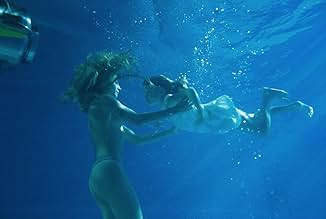Diverses vies convergent sur une île isolée, toutes reliées par un auteur dont le roman est devenu inextricablement entrelacé avec sa propre vie.Diverses vies convergent sur une île isolée, toutes reliées par un auteur dont le roman est devenu inextricablement entrelacé avec sa propre vie.Diverses vies convergent sur une île isolée, toutes reliées par un auteur dont le roman est devenu inextricablement entrelacé avec sa propre vie.
- Réalisation
- Scénario
- Casting principal
- Récompenses
- 11 victoires et 18 nominations au total
María Álvarez
- Enfermera
- (as María Alvarez)
Javier Coromina
- Camarero Chiringuito
- (as Javier Corominas)
Alesandra Álvarez
- Luna 1 año
- (as Alesandra Alvarez)
José Ferreira
- Emplastro
- (non crédité)
Avis à la une
10Core242
The earlier film by Julio Médem (Lovers of the Arctic Circle) is a prelude to the kind of cinematography that this Spanish film director/writer presents here. I have read most of the other comments, but they don't do justice to it, mainly because of the lack of understanding the original tongue of this film. The screenplay is excellent, full of metaphors and a rich use of very carefully chosen words. People who consider this film just an excuse for depicting sex scenes as the highlight of the movie are pretty much clueless. It is more than that, it is the complex storytelling that tangles the characters in this movie and the way that is told. Compelling and breath-taking. A must see.
This is one of the better structured movies ever put to screen. It's as complex as Lynch's Lost Highway, but that only adds to the experience. A non-linear structure (in time and space) is applied and Lucia y el Sexo blurs the line between reality and imagination.
Basically, it's like Mulholland Drive: Most of what we see is a dream, imagination. Only a relatively small part did really happen. But this goes one step further: What part is in the eye of the beholder here, because little clues are given so the mystery format is only used to keep us entertained at a basic level.
A writer is the center here. Some parts of his life are probably true (trouble at home, sickness), others are ambiguous, others are certainly imagined. He is in the meta-story, but also places himself in threads in the other stories that come from his imagination. His imagination is formed by applying smaller and larger events (meeting a person at a party, seeing someone in front of the house) in his personal life to his fantasies. His erotic fantasies explain the title, as sex is one of the characters of the story. One of the story lines is again about his script read on the island by one of his imagined characters. Writing the story and telling the story is done simultaneously. As he becomes sick, the characters become helpless in the story. Overall it helps a lot if you keep imagining that you're watching imagined characters being manipulated by the writer. This combines meta-story and story, real with imagination, weaving several threads in a complicated web of story lines. In the end, it is made clear that the story doesn't end but starts again halfway, giving further evidence that viewers can use their imagination at random on this and create their own story out of it.
The meta-story is interesting, but by mixing it with the story itself we see the real story as what it is, a writing trick with imagined characters. That unfortunately diminishes the emotions a movie tries to convey. We're merely watching how a movie is structured, with the imagined story not having the usual dramatic impact.
It's remarkable that so many people are offended by the sex scenes, as it's already in the title. Do they also complain about the presence of aliens in Alien? I found the sex scenes to be made with some honesty; and at least they didn't even shy away of male nudity.
Basically, it's like Mulholland Drive: Most of what we see is a dream, imagination. Only a relatively small part did really happen. But this goes one step further: What part is in the eye of the beholder here, because little clues are given so the mystery format is only used to keep us entertained at a basic level.
A writer is the center here. Some parts of his life are probably true (trouble at home, sickness), others are ambiguous, others are certainly imagined. He is in the meta-story, but also places himself in threads in the other stories that come from his imagination. His imagination is formed by applying smaller and larger events (meeting a person at a party, seeing someone in front of the house) in his personal life to his fantasies. His erotic fantasies explain the title, as sex is one of the characters of the story. One of the story lines is again about his script read on the island by one of his imagined characters. Writing the story and telling the story is done simultaneously. As he becomes sick, the characters become helpless in the story. Overall it helps a lot if you keep imagining that you're watching imagined characters being manipulated by the writer. This combines meta-story and story, real with imagination, weaving several threads in a complicated web of story lines. In the end, it is made clear that the story doesn't end but starts again halfway, giving further evidence that viewers can use their imagination at random on this and create their own story out of it.
The meta-story is interesting, but by mixing it with the story itself we see the real story as what it is, a writing trick with imagined characters. That unfortunately diminishes the emotions a movie tries to convey. We're merely watching how a movie is structured, with the imagined story not having the usual dramatic impact.
It's remarkable that so many people are offended by the sex scenes, as it's already in the title. Do they also complain about the presence of aliens in Alien? I found the sex scenes to be made with some honesty; and at least they didn't even shy away of male nudity.
This movie in my view is not understandable without any notion of the 'soul', whose movements are made visible by magnificent underwater shots. The sexual scenery functions not only as entrance to the story; I think Medem really wanted to depict something like 'the ultimate sex' both as experience and as ultimate, divine ideal, something like Goethes 'eternal feminine.' As something to strive for, it can deeply affect our lives by giving it the splendour we need to keep it worthwhile, even if we fail. At the same time, it is also a power deep down, a dark shadow that haunts us. It's for us to see, to accept, and to decide: do we want to go to our island and unite the two, as Lucia does? In that case, we might see that in the end our stories come true as well, be it by breaking in in the middle.
The question I asked myself after watching the movie for the third time was: where exactly is this 'middle' of it? It seems to me that it's around the scene where Elena is walking through Madrid with Luna in her baby carriage, while passing the apartment of Lucia and Lorenzo. From then on, the decisions made by the novelist - like the shivery death of his child - are such that there is no way back. Lorenzo, Lucia and their relationship are too heavily shaken up. Both have to get into a new reality which can transform their personalities; to both, this means a form of dying and leaving their old personalities behind. They surely resist this, especially Lorenzo; but also he has to put himself at risk, following the demands of his 'blood', that is, of his sex, death and rebirth. And there the story takes over the initiative from the writer, who himself is thrown into it - in the middle, where he leaves his home and runs into his 'accident'. Exactly that scene is not shown - it's the hole in the middle, through which the old reality passes into the new.
For me, this movie is a small masterpiece, which shows how film and literature can work together, and how more powerful ideas about ourselves are then the circumstances we are put into. The 'form' of the persons is therefore changeable: like Lorenzo during the last Island episode has 'changed' into Carlos. As the 'transformed' Lorenzo turns up on the island, with his distress and his love for both Elena and Lucia, 'Carlos' is no longer necessary and the women can leave him behind. The fact that Elena is eventually able to weep, marks the acceptance of her loss, which 'naturally' returns her child to her from the middle of the picture again.
The question I asked myself after watching the movie for the third time was: where exactly is this 'middle' of it? It seems to me that it's around the scene where Elena is walking through Madrid with Luna in her baby carriage, while passing the apartment of Lucia and Lorenzo. From then on, the decisions made by the novelist - like the shivery death of his child - are such that there is no way back. Lorenzo, Lucia and their relationship are too heavily shaken up. Both have to get into a new reality which can transform their personalities; to both, this means a form of dying and leaving their old personalities behind. They surely resist this, especially Lorenzo; but also he has to put himself at risk, following the demands of his 'blood', that is, of his sex, death and rebirth. And there the story takes over the initiative from the writer, who himself is thrown into it - in the middle, where he leaves his home and runs into his 'accident'. Exactly that scene is not shown - it's the hole in the middle, through which the old reality passes into the new.
For me, this movie is a small masterpiece, which shows how film and literature can work together, and how more powerful ideas about ourselves are then the circumstances we are put into. The 'form' of the persons is therefore changeable: like Lorenzo during the last Island episode has 'changed' into Carlos. As the 'transformed' Lorenzo turns up on the island, with his distress and his love for both Elena and Lucia, 'Carlos' is no longer necessary and the women can leave him behind. The fact that Elena is eventually able to weep, marks the acceptance of her loss, which 'naturally' returns her child to her from the middle of the picture again.
I found this film absolutely terrific. Ik know there's a lot of sex in it and yes, there are a lot of suspicious coincidences, but I looked past that.
For starters, I loved the story, it wasn't boring at all, despite what some may say. It was a sort of twisty fairytale to me, just like 'Los Amantes del Circulo Polàr' was. I love good fairy tales!
The acting was very good by most actors (I love you Najwa!), and good by the others. Even the girl that played Luna was convincing.
The film has a lot of explicit scenes (sexual and non-sexual) but besides from that Médem accomplishes to put a lot of suggestion in it (sexual and non-sexual). If you watch it attentively and past merely what you see, you will notice the subtlety of the characters and story.
Last of all i would like to say that the English title (Sex and Lucia) is an abomination to the original title (Lucia y el Sexo). The word are the same, but the word order has flipped, which gives the title a whole other meaning, to my opinion. The film is about Lucia and the meaning sex has in her life and the life of others. It is not about sex and the way Lucia handles with it. The meaning of film titles is often lost in translation (no pun intended). Why can't American (and other) people keep the original title? We can in Belgium.
A la proxima
For starters, I loved the story, it wasn't boring at all, despite what some may say. It was a sort of twisty fairytale to me, just like 'Los Amantes del Circulo Polàr' was. I love good fairy tales!
The acting was very good by most actors (I love you Najwa!), and good by the others. Even the girl that played Luna was convincing.
The film has a lot of explicit scenes (sexual and non-sexual) but besides from that Médem accomplishes to put a lot of suggestion in it (sexual and non-sexual). If you watch it attentively and past merely what you see, you will notice the subtlety of the characters and story.
Last of all i would like to say that the English title (Sex and Lucia) is an abomination to the original title (Lucia y el Sexo). The word are the same, but the word order has flipped, which gives the title a whole other meaning, to my opinion. The film is about Lucia and the meaning sex has in her life and the life of others. It is not about sex and the way Lucia handles with it. The meaning of film titles is often lost in translation (no pun intended). Why can't American (and other) people keep the original title? We can in Belgium.
A la proxima
This Spanish film has an unusual look and feel and dares to take chances in the way that it mixes fantasy and reality. The result is an interesting film, which is often confusing and frustrating. I'm sure that this was not entirely accidental and that the filmmakers wanted to keep the audience in a state of disorientation. Nevertheless, the convolutions of the story appear to serve no other purpose than to keep us off balance.
The films biggest sin is the scene in the middle of the film where the daughter Luna opens the bedroom door. The following event is presented in such a way that we are left guessing as to what has just happened. There's no reason for withholding it, except the misguided idea that lack of clarity is artistically valuable. I think that despite it's flaws, this film shows a great vibrancy and energy.
People talk a lot about the sex scenes. The film doesn't have much to say about sex and it certainly isn't about sex. Nevertheless, the scenes do not seem tacked on for the sake of it and, in an era when Hollywood seems to be gripped by a new puritanism, it's refreshing to see a frank depiction of what is, after all, an important aspect of the relationship between these characters.
The films biggest sin is the scene in the middle of the film where the daughter Luna opens the bedroom door. The following event is presented in such a way that we are left guessing as to what has just happened. There's no reason for withholding it, except the misguided idea that lack of clarity is artistically valuable. I think that despite it's flaws, this film shows a great vibrancy and energy.
People talk a lot about the sex scenes. The film doesn't have much to say about sex and it certainly isn't about sex. Nevertheless, the scenes do not seem tacked on for the sake of it and, in an era when Hollywood seems to be gripped by a new puritanism, it's refreshing to see a frank depiction of what is, after all, an important aspect of the relationship between these characters.
Le saviez-vous
- AnecdotesThey say "the island" many times but they don't say its name. It is in fact, the tiny island of Formentera.
- GaffesIn one scene,the nipples of nude female are not same.
- Crédits fousCredits scroll in the opposite direction.
- Versions alternativesThe US cut removes most of the frontal nudity and runs approximately 2 minutes shorter.
- ConnexionsFeatured in Brows Held High: Room in Rome (2013)
- Bandes originalesUn Rayo de Sol
Written by Daniel Vangarde (as Vangarde), Claude Carrère and Amado Jaén (as Jaen)
(c) Bleu Blanc Rouge Editions Soc - Editions Productions Zagora
Ediciones Musicales Clipper's, S.L.
Meilleurs choix
Connectez-vous pour évaluer et suivre la liste de favoris afin de recevoir des recommandations personnalisées
Détails
- Date de sortie
- Pays d’origine
- Site officiel
- Langues
- Aussi connu sous le nom de
- Lucía y el sexo
- Lieux de tournage
- Sociétés de production
- Voir plus de crédits d'entreprise sur IMDbPro
Box-office
- Montant brut aux États-Unis et au Canada
- 1 594 779 $US
- Week-end de sortie aux États-Unis et au Canada
- 47 591 $US
- 14 juil. 2002
- Montant brut mondial
- 7 640 680 $US
- Durée
- 2h 8min(128 min)
- Couleur
- Mixage
- Rapport de forme
- 2.35 : 1
Contribuer à cette page
Suggérer une modification ou ajouter du contenu manquant
































